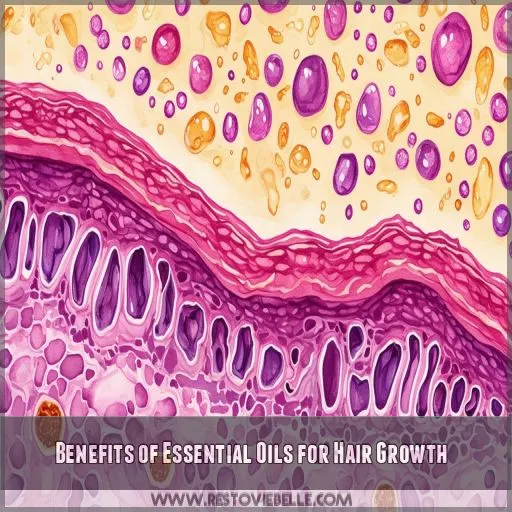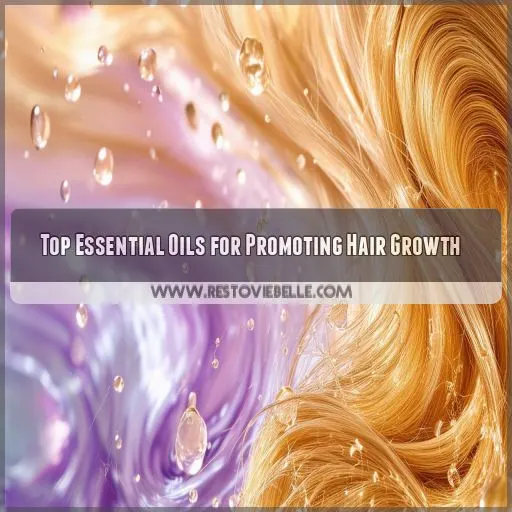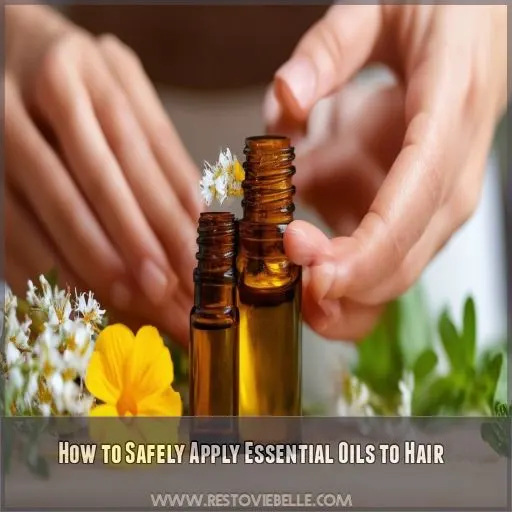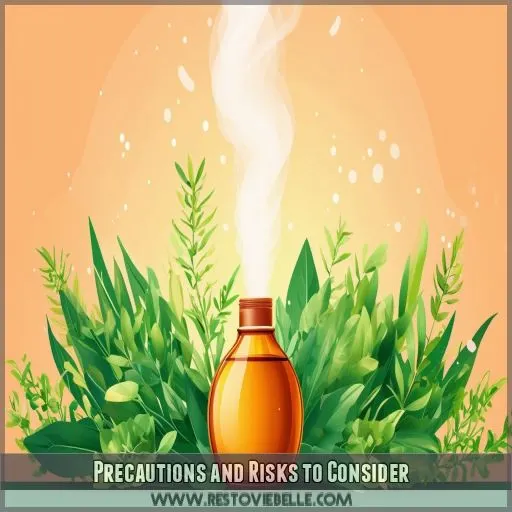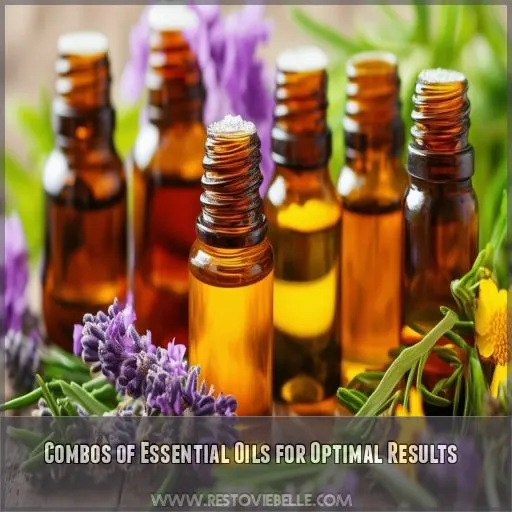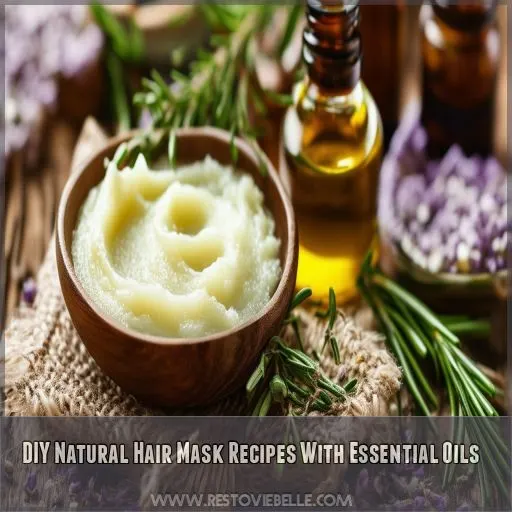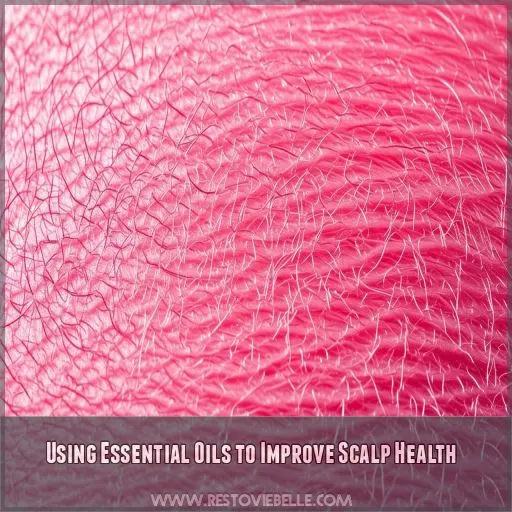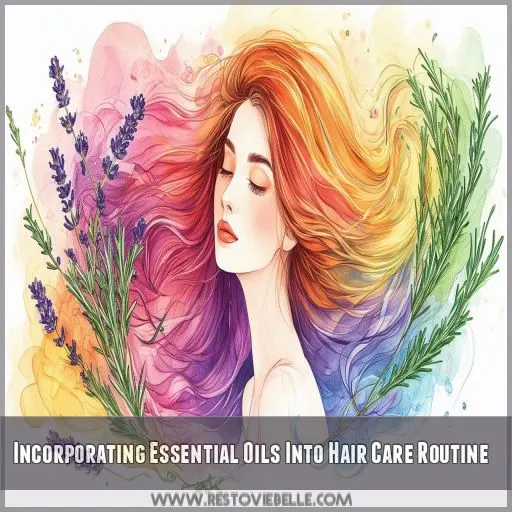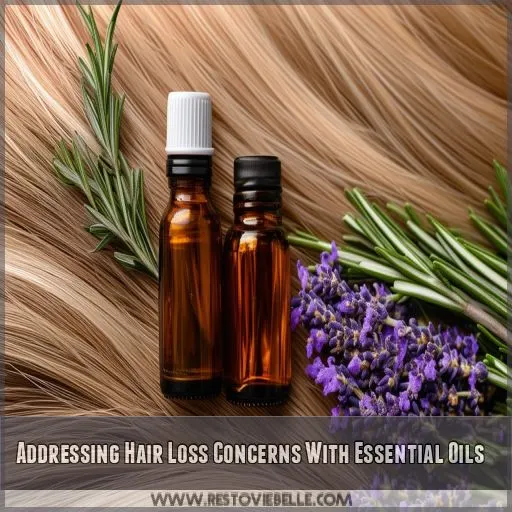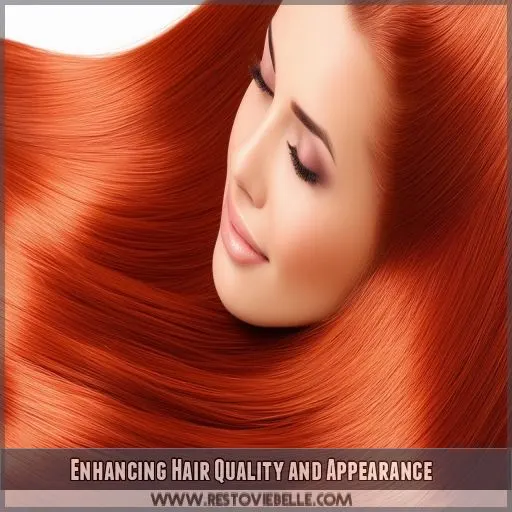This site is supported by our readers. We may earn a commission, at no cost to you, if you purchase through links.
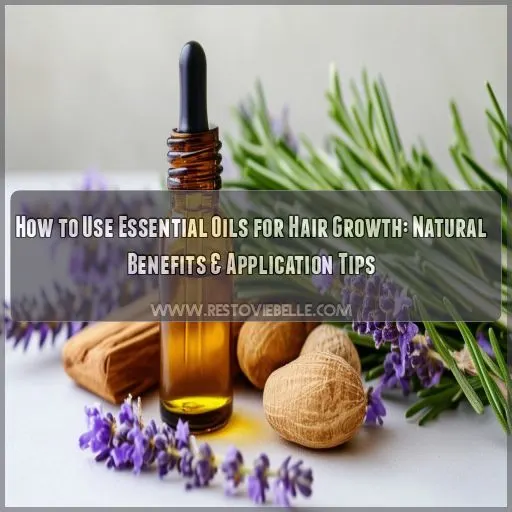
From promoting follicle stimulation to enhancing scalp health, these potent extracts offer a holistic approach to achieving luscious locks.
Learn which oils work best, how to safely apply them, and precautions to be aware of.
Table Of Contents
- Key Takeaways
- How to Use Essential Oils for Hair Growth and Benefits?
- Benefits of Essential Oils for Hair Growth
- Top Essential Oils for Promoting Hair Growth
- How to Safely Apply Essential Oils to Hair
- Precautions and Risks to Consider
- Combos of Essential Oils for Optimal Results
- DIY Natural Hair Mask Recipes With Essential Oils
- Using Essential Oils to Improve Scalp Health
- Incorporating Essential Oils Into Hair Care Routine
- Addressing Hair Loss Concerns With Essential Oils
- Enhancing Hair Quality and Appearance
- Frequently Asked Questions (FAQs)
- What is the best way to use essential oils for hair growth?
- Which essential oil makes hair grow faster?
- Can I apply essential oil directly to hair?
- What is the best way to use oil for hair growth?
- How long does it take to see results?
- Can essential oils help with receding hairlines?
- Are there any essential oils to avoid?
- Do essential oils work for all hair types?
- Can essential oils interfere with hair dye or treatments?
- Conclusion
Key Takeaways
- Essential oils are your hair’s new BFF – they can stimulate follicles, boost scalp health, and even thicken your locks. It’s like giving your scalp a spa day!
- Mix and match for maximum mane magic. Blend oils like bergamot, jojoba, and peppermint for a hair growth cocktail that’ll make your tresses say "thank you!"
- Safety first, gorgeous growth second. Always dilute those potent potions with carrier oils and do a patch test. Your scalp will thank you for not turning it into a science experiment gone wrong.
- Patience is a virtue, especially when it comes to your luscious locks. Stick with your oily routine for 3-6 months, and you might just end up with hair that rivals Rapunzel’s.
How to Use Essential Oils for Hair Growth and Benefits?
Curious about how to use essential oils for hair growth and their benefits? You’re in for a treat! These natural powerhouses can stimulate your hair follicles, boost scalp health, and even increase hair thickness.
To get started, mix a few drops of growth-promoting oils like bergamot, jojoba, or peppermint with a carrier oil. Apply this blend to your scalp, gently massaging it in for 30 minutes to overnight. Remember to do a patch test first and use diluted applications.
For best results, incorporate essential oils into your hair care routine a few times weekly.
Ready to reveal the secrets of luscious locks? There’s more to discover about these hair-raising remedies.
Benefits of Essential Oils for Hair Growth
You can harness the power of essential oils to promote hair growth by stimulating follicles, enhancing scalp health, and increasing hair thickness. These natural remedies offer a holistic approach to improving your hair’s overall quality and appearance, potentially addressing concerns like thinning or slow growth.
Promoting Follicle Stimulation
Essential oils can stimulate your hair follicles, promoting growth and thickness. By diluting oils like rosemary or tea tree with a carrier oil, you’re setting the stage for healthier locks. Apply this mix regularly, but don’t overdo it – you don’t want greasy hair!
Scalp Health Enhancement
Essential oils can work wonders for your scalp health. Their antiseptic and antimicrobial properties combat dandruff and infections, while anti-inflammatory effects soothe irritation. Oils like lavender and cedarwood boost circulation, promoting wound healing. Incorporating these into your hair care routine can transform your scalp’s condition.
Increased Hair Thickness
You’ll love how essential oils can boost your hair’s thickness. By diluting them in carrier oils and applying with a scalp massage, you’re not just nourishing your locks but also potentially reducing dandruff. Try rosemary, lemongrass, sage, ylang-ylang, or peppermint for ideal results in leave-in treatments.
Top Essential Oils for Promoting Hair Growth
You’ll find that bergamot, jojoba, and peppermint oils are among the most effective for promoting hair growth. Each of these oils offers unique benefits, from stimulating follicles to enhancing scalp health, making them valuable additions to your natural hair care routine.
Bergamot and Its Benefits
Moving from general benefits to specific oils, let’s explore bergamot. This citrusy essential oil is a powerhouse for hair health. It fights inflammation, promotes wound healing, and boasts antimicrobial properties. Bergamot’s unique blend of benefits makes it a top choice for natural hair growth remedies.
Jojoba and Its Growth Stimulation
Moving from bergamot’s benefits, let’s explore jojoba oil. This versatile carrier oil promotes faster hair growth and may reduce hair loss. It’s like your scalp’s best friend, potentially increasing hair thickness and supporting a healthy environment for your locks to thrive.
Peppermint’s Effective Growth Promotion
Peppermint oil’s vasodilating properties can supercharge your hair growth cycle. It boosts blood flow and cell proliferation, promoting hair follicle regeneration. You’ll love how this powerhouse essential oil outperforms even minoxidil in stimulating growth. Ready to give your locks a natural boost?
How to Safely Apply Essential Oils to Hair
To safely apply essential oils to your hair, you’ll need to mix them with carrier oils and perform a skin patch test first. You can apply the diluted oils to your scalp and hair, leaving them on for 30 minutes or overnight, depending on your preference and hair needs.
Mixing With Carrier Oils
When using essential oils for hair growth, you’ll need to mix them with carrier oils. This dilution is important for safe application and effective results. Here’s what you need to know:
- Jojoba oil mimics your scalp’s natural sebum
- Coconut oil penetrates hair shafts deeply
- Almond oil soothes and moisturizes effectively
Skin Patch Testing Importance
Before applying essential oils to your scalp, always perform a patch test. Mix a small amount of diluted oil with your chosen carrier oil and apply it to a discreet area. Wait 24 hours to check for any skin irritation or allergic reactions, ensuring safe use.
Timings for Application
When applying essential oils, timing is key. You can leave them in overnight or rinse after 30 minutes, depending on your hair type. For best results, massage into your scalp and use a few times weekly. Adjust frequency based on how your hair responds.
Precautions and Risks to Consider
While essential oils can offer many benefits for hair growth, it’s important to be aware of potential risks. You should always perform a patch test before applying essential oils to your scalp, and if you’re pregnant or breastfeeding, consult with a healthcare professional before use.
Allergic Reactions Possible
While essential oils can work wonders for your hair, they’re not without risks. You might experience allergic reactions, especially if you’re pregnant or breastfeeding. Always do a patch test before applying oils to your scalp, and watch for any signs of skin sensitivity.
Sun Sensitivity Concerns
While essential oils can work wonders for your hair, they might make your skin more sensitive to sunlight. To protect yourself, limit sun exposure after application, especially if you’ve got fair skin or existing scalp conditions. Adjust your application frequency based on your hair type and product formulations.
Pregnancy And Breastfeeding Cautions
When you’re pregnant or breastfeeding, exercise caution with essential oils. Some can pose risks to your baby’s development. Always consult your doctor before using any oils. If given the green light, stick to diluted applications and perform allergy tests to verify safety for you and your little one.
Combos of Essential Oils for Optimal Results
You can boost your hair growth efforts by combining essential oils for enhanced benefits. Try blending cedarwood, clary sage, and lavender oils, or mix jojoba, clary sage, and cedarwood for a potent hair-nourishing treatment.
Cedarwood, Clary Sage, and Lavender Blend
Now that you’re aware of the precautions, let’s explore a powerful blend for superior hair growth. Combining cedarwood, clary sage, and lavender creates a potent mix that caters to various hair types.
This DIY recipe not only stimulates growth but also promotes scalp health. The ingredients work synergistically, offering a range of benefits from follicle stimulation to soothing irritation.
You’ll love how this blend transforms your hair care routine.
Jojoba, Clary Sage, and Cedarwood Mix
You’ll love this powerful trio for hair growth: jojoba, clary sage, and cedarwood. Mix these oils to create a potent blend that stimulates your scalp and promotes thicker, healthier hair. Jojoba moisturizes, clary sage balances oil production, and cedarwood boosts circulation. Apply this mix twice weekly for best results. Here’s why you’ll fall in love with this combo:
- Nourishes your scalp like a spa treatment
- Awakens dormant follicles, giving you lush locks
- Smells divine, transforming your bathroom into a forest retreat
- Builds your confidence with every application
- Connects you to nature’s healing power
DIY Natural Hair Mask Recipes With Essential Oils
Now that you’ve explored essential oil combos, let’s whip up some DIY hair masks to boost your growth game. These homemade hair treatments are a fun way to harness essential oil benefits while pampering your locks.
For a moisturizing mask, mix 2 tablespoons of coconut oil with 5 drops each of lavender and rosemary oils. Apply to damp hair, leave for 30 minutes, then rinse.
Craving a protein boost? Blend an egg with a tablespoon of olive oil and 3 drops of peppermint oil. Massage into your scalp and hair, wait 20 minutes, and wash out.
For a clarifying treatment, combine 1/4 cup apple cider vinegar, 1/4 cup water, and 2 drops of tea tree oil. Use as a final rinse after shampooing.
These natural hair growth solutions are easy, effective, and smell divine!
Using Essential Oils to Improve Scalp Health
Your scalp’s health is essential for vibrant, growing hair. Essential oils can be your secret weapon in combating common issues like dandruff, itchiness, and premature graying.
To tackle dandruff and soothe an itchy scalp, try tea tree or lavender oil. These powerhouses have antimicrobial properties that’ll keep your scalp clean and calm.
Worried about those silver strands? Rosemary oil might be your new best friend. It’s known to help prevent premature graying and promote overall scalp health.
For a rejuvenating scalp massage, mix a few drops of peppermint oil with a carrier oil. This combo will stimulate blood flow and may even wake up dormant hair follicles.
Incorporating Essential Oils Into Hair Care Routine
Now that you’ve learned about improving scalp health, let’s integrate essential oils into your daily hair care routine.
Start by diluting your chosen oils to prevent skin irritation. You can add a few drops to your shampoo or conditioner for a quick boost. For a more intensive treatment, create a DIY hair mask by mixing essential oils with a carrier oil like coconut or jojoba.
Apply this concoction to your scalp and hair, massaging gently to stimulate growth. Leave it on for 30 minutes or overnight for maximum benefits.
With patience and regular use, you’ll be on your way to luscious, healthy locks in no time.
Addressing Hair Loss Concerns With Essential Oils
Now that you’ve incorporated essential oils into your routine, let’s tackle hair loss head-on. Hair loss can stem from various causes, including scalp conditions and nutritional deficiencies. Essential oils can be your secret weapon in this battle.
By addressing underlying issues like poor scalp health and hair breakage, you’re setting the stage for healthier growth. Create potent essential oil blends designed for your specific hair loss concerns. For instance, a mix of rosemary and peppermint oils can stimulate follicles, while lavender and tea tree oils combat scalp issues.
Don’t forget to nourish your hair from within by consuming hair growth nutrients like biotin and omega-3s. Remember, consistency is key. Regular use of these natural remedies, combined with a balanced diet, can help you regain your luscious locks and boost your confidence.
Enhancing Hair Quality and Appearance
While addressing hair loss concerns, you’ve taken steps to nourish your scalp and promote growth. Now, let’s focus on enhancing your hair’s quality and appearance.
Essential oil blends can work wonders for scalp rejuvenation and hair shine enhancement. Try mixing chamomile and coconut oils for a natural shine boost. These oils’ anti-aging properties can help restore luster to dull locks.
For a deep conditioning treatment, blend jojoba and lavender oils. Massage this mixture into your scalp for natural scalp care that’ll leave your hair feeling silky smooth. Don’t forget about rosemary oil – it’s known for improving circulation and promoting a healthy scalp environment.
Frequently Asked Questions (FAQs)
What is the best way to use essential oils for hair growth?
Mix essential oils with a carrier oil, then massage into your scalp. You’ll want to dilute them properly and apply regularly. Try rosemary or peppermint oil for best results. Always patch test first to avoid irritation.
Which essential oil makes hair grow faster?
Picture a lush forest, growing rapidly. Peppermint oil‘s your secret weapon for faster hair growth. It’s more effective than minoxidil, increasing follicle count and scalp thickness. Dilute it with a carrier oil and massage in regularly for best results.
Can I apply essential oil directly to hair?
You shouldn’t apply undiluted essential oils directly to your hair. Always mix them with a carrier oil first. This prevents scalp irritation and guarantees even distribution. You’ll reap the benefits without risking damage to your locks.
What is the best way to use oil for hair growth?
Ready to boost your hair growth? Mix essential oils with a carrier oil, then gently massage into your scalp. Leave it overnight or rinse after 30 minutes. Consistency is key – try this routine 2-3 times weekly for best results.
How long does it take to see results?
Results from using essential oils for hair growth vary, but you’ll typically notice improvements within 3-6 months of consistent use. Be patient and stick to your routine. Remember, everyone’s hair responds differently to treatments.
Can essential oils help with receding hairlines?
Essential oils may help with receding hairlines by stimulating hair follicles and improving scalp health. You’ll want to mix them with a carrier oil and massage them into your scalp regularly. Results can vary, so be patient and consistent.
Are there any essential oils to avoid?
While essential oils can nourish your locks, some can be harsh on your scalp. You’ll want to avoid tea tree, eucalyptus, and wintergreen oils. They’re potent and may cause irritation. Always dilute and patch-test before use.
Do essential oils work for all hair types?
Essential oils can benefit all hair types, but their effectiveness varies. You’ll need to experiment to find what works best for your hair. Remember to dilute oils properly and patch test to avoid potential reactions.
Can essential oils interfere with hair dye or treatments?
You’ll want to be cautious when using essential oils with hair treatments. They can potentially interact with dyes or chemicals, affecting color retention or treatment efficacy. It’s best to consult your stylist before combining oils with professional hair services.
Conclusion
Picture your hair thriving, nourished by nature’s essences. You’ve learned how to use essential oils for hair growth and their benefits, revealing a world of natural possibilities.
From stimulating follicles to enhancing scalp health, these potent extracts offer a holistic approach to achieving your hair goals.
Remember to apply safely, be aware of precautions, and explore beneficial combinations.

